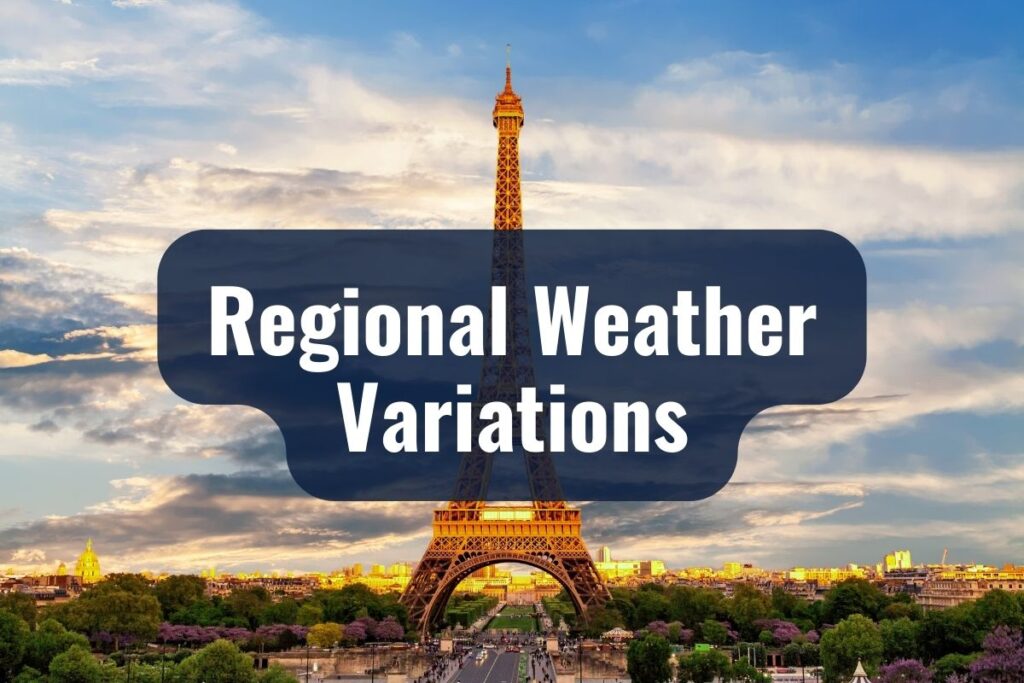July is one of the most vibrant months in France, marked by long sunny days and a bustling atmosphere as tourists and locals alike take to the streets to enjoy the summer. The weather plays a crucial role in how you experience the various regions of France, from the sunny beaches of the South to the cooler, sometimes rainier climes of the North.
Understanding the weather is key to planning your travels, activities, and what to pack. This article will guide you through the typical weather patterns you can expect in France during July, ensuring you are well-prepared for your stay.
KEY TAKEAWAYS
- Regional Weather Variations: France’s diverse geography leads to distinct weather patterns across different regions in July.
- Temperature Ranges: Expect warm to hot temperatures nationwide, with regional variations and occasional heatwaves.
- Precipitation and Humidity: Northern France sees more rain, while the South enjoys drier conditions, with varying humidity levels across the country.
- Sunshine and Daylight Hours: July offers long days of sunshine, necessitating sun protection, and planning for extended outdoor activities.
- Dressing for the Weather: Light, breathable, and versatile clothing is ideal, with additional layers for cooler evenings and rain protection.
- Popular Activities and Events: July’s warm weather is perfect for enjoying festivals, beaches, and outdoor activities across France.
The Significance of Weather Knowledge
For foreigners, especially those not familiar with European or specifically French climate patterns, grasping the nuances of July weather can significantly enhance the experience. Whether you’re visiting France for leisure, work, or study, knowing what to expect from the weather means you can make informed decisions about everything from clothing choices to the best time for outdoor activities.
Regional Weather Variations

Understanding the regional weather variations in France is essential for planning any trip in July, as the country’s diverse geography leads to a wide range of weather patterns. Here’s what you can expect in different parts of France during this summer month.
North France: Cooler Breezes and Occasional Showers
In Northern France, including regions like Normandy and Brittany, July is generally warm but not excessively hot. You can expect:
Temperatures: Mild to warm with average highs typically in the low to mid-20s°C (70s°F). Evenings can be cooler, especially near the coast.
Rainfall: Occasional showers are possible, so it’s wise to have an umbrella or raincoat handy.
Overall Climate: A temperate maritime climate with a fair amount of variability day-to-day.
South France: Mediterranean Warmth and Sunshine
The South of France, including the French Riviera and Provence, is famed for its Mediterranean climate, offering:
Temperatures: Warm to hot, with averages in the high 20s to low 30s°C (80s to 90s°F). Heatwaves can push temperatures even higher, particularly inland.
Rainfall: Generally dry, especially along the coast, making it ideal for beachgoers.
Overall Climate: Hot, sunny days followed by balmy evenings, perfect for outdoor dining and nightlife.
East France: Continental Influences and Alpine Breezes
The Eastern regions, from Alsace and Lorraine down to the French Alps, show a more continental climate with:
Temperatures: Generally warm, but can vary significantly from day to night. Mountain areas like the Alps are cooler, especially at higher altitudes.
Rainfall: Variable, with occasional summer storms, especially in the mountainous areas.
Overall Climate: Warm days with cooler nights and unpredictable weather in the mountain regions.
West France: Atlantic Freshness and Variable Weather
The Western parts of France, including the Loire Valley and Bordeaux region, are influenced by the Atlantic Ocean, featuring:
Temperatures: Moderate to warm, with averages similar to those in Northern France but can be more variable.
Rainfall: Frequent Atlantic fronts can bring rain and breezy conditions, interspersed with sunny spells.
Overall Climate: A mix of sun and clouds with a refreshing Atlantic breeze, making it less predictably sunny than the south but often pleasantly mild.
Temperature Ranges
July is typically one of the warmest months across France, but the temperature can vary significantly from one region to another. Here’s what you might expect in terms of temperature ranges during this summer month.
| Region | Average High (°C) | Average Low (°C) | Notes |
| North France | 22 – 25 | – | Cooler evenings, occasional showers |
| South France | 28 – 30 | – | Hotter, especially during heatwaves |
| East France | 24 – 26 | – | Variable, cooler in mountainous areas |
| West France | 23 – 26 | – | Moderate, influenced by Atlantic breezes |
Average Highs and Lows
Northern France: In regions like Paris and Normandy, daytime highs average around 22°C to 25°C (72°F to 77°F), with cooler mornings and evenings that might require a light jacket.
Southern France: Expect warmer conditions, especially in the Mediterranean areas where average highs hover around 28°C to 30°C (82°F to 86°F), occasionally reaching into the mid-30s°C (mid-90s°F) during heatwaves.
Eastern France: Areas closer to the Alps and the German border experience average highs similar to the north, around 24°C to 26°C (75°F to 79°F), but can have cooler evenings due to the elevation and continental climate.
Western France: Influenced by the Atlantic, temperatures here are usually moderate, with highs around 23°C to 26°C (73°F to 79°F), though it can be more variable with passing coastal weather systems.
Considering Heatwaves
Frequency and Impact: Heatwaves are becoming more common and can significantly increase temperatures, especially in south and central France. Cities can feel particularly hot due to the urban heat island effect.
Preparation: It’s important for visitors to stay hydrated, seek shade during the hottest parts of the day, and wear sun protection. Always check the local weather forecast for heat advisories.
Regional Nuances
Understanding these temperature ranges helps in planning your activities and what to wear. While the south basks in warmth and sunshine, the north and coastal regions provide a cooler and sometimes more variable climate, offering a comfortable escape from the heat for some travelers.
Whether you’re exploring the sun-drenched beaches of the Riviera or the historic streets of Paris, being aware of the typical temperature ranges will ensure you’re well-prepared for your journey through France in July.
Precipitation and Humidity

In July, the amount and frequency of precipitation, as well as humidity levels, can affect your travel experience in France. Here’s a breakdown of what you might expect in terms of rainfall and humidity during this summer month.
Rainfall Patterns
Northern France: This region can experience occasional showers and is generally more prone to rain than the south. The average rainfall is moderate, but carrying an umbrella is advisable.
Southern France: Typically, the south enjoys a dry and sunny climate in July, especially along the Mediterranean coast. However, when it does rain, it can be in the form of brief, heavy showers or thunderstorms.
Eastern France: The climate can vary, but summer storms, especially in the mountainous areas, are not uncommon. These can bring sudden downpours, particularly in the late afternoon.
Western France: Influenced by the Atlantic, this region can have unpredictable weather with rain interspersed with sunny periods. The rainfall is usually not excessive but can be persistent.
Humidity Levels
General Feel: While the south of France tends to be dry and comfortable, humidity can be higher in the north and along the Atlantic coast, contributing to a muggier feel, especially during and after rain showers.
Comfort and Considerations: High humidity levels, particularly in urban areas or during occasional heatwaves, can make the actual temperature feel hotter. It’s important for visitors to pace themselves, stay hydrated, and seek air-conditioned spaces when available.
Coping with Precipitation and Humidity
Clothing: Light, breathable clothing is ideal. Carry a lightweight, waterproof jacket or umbrella for unexpected showers.
Planning: Check the daily weather forecast to plan your activities, especially if they involve being outdoors for extended periods.
Health Precautions: Stay hydrated and take breaks in shaded or air-conditioned areas, particularly on hot and humid days.
Sunshine and Daylight Hours
July is characterized by long days and plenty of sunshine across most of France, which greatly influences daily activities and mood. Here’s what you should know about the sunshine and daylight hours during this summer month.
Average Hours of Daylight
Long Days: July is one of the months with the longest days of the year. You can expect daylight to last from early in the morning until late in the evening, with the longest days in the northern regions due to their higher latitude.
Sunrise and Sunset Times: While specific times vary across the country, generally, sunrise is around 6:00 AM and sunset is close to 10:00 PM in many parts. This provides ample daylight for sightseeing, outdoor activities, and enjoying the scenic beauty of France.
Sunshine Intensity
North and West France: These regions enjoy plenty of sunshine but are more likely to have intermittent cloudy days or passing showers. The sunlight is generally less intense than in the south.
South and East France: Here, the sun is stronger, especially in the Mediterranean area, where clear, sunny skies dominate the month. The intensity of the sun calls for adequate protection.
Sun Protection Advice
Given the long hours of daylight and the potential for strong sun, it’s important for visitors to:
Wear Sunscreen
High-SPF sunscreen should be applied regularly, especially during midday hours when the sun is strongest.
Seek Shade
During the peak sun hours, usually between 11 a.m. and 4 p.m., seek shade or plan indoor activities to avoid overexposure.
Wear Protective Clothing
Hats, sunglasses, and light, long-sleeved clothing can provide additional protection against UV rays.
Enjoying the Long Days
The extended daylight hours offer many benefits for visitors.
More Sightseeing Time
Take advantage of the long days to explore more sights, enjoy leisurely evening walks, and experience the local culture.
Outdoor Activities
Whether it’s a picnic in the park, a day at the beach, or hiking in the countryside, the long daylight hours are perfect for outdoor pursuits.
Vibrant Nightlife
Evenings are longer and typically mild, making it a great time to explore local eateries, enjoy outdoor concerts, or stroll through night markets.
Dressing for the Weather

Dressing appropriately for the weather is key to ensuring a comfortable and enjoyable experience in France during July. Here’s how you can prepare wardrobe-wise for the varying conditions:.
General Recommendations
Lightweight and Breathable Fabrics: Opt for clothes made from cotton, linen, or other light materials that allow your skin to breathe and cope with the warmth.
Layering: Even though July is generally warm, temperatures can vary, especially in the evenings or in certain regions. Bring a mix of short-sleeved and long-sleeved options, and always have a light jacket or sweater on hand.
For Sunny and Hot Days
Sun Protection Clothing: Wear hats with wide brims, sunglasses with UV protection, and if possible, clothing with built-in UV protection.
Comfortable Footwear: Choose open, airy shoes for casual walks and sturdy, breathable footwear for any outdoor activities or extensive walking.
For Cooler Evenings and Variable Weather
Light Jacket or Sweater: A light jacket or sweater is essential for cooler mornings and evenings, particularly in the north and in mountainous regions.
Scarves or Shawls: These can be easily carried, provide extra warmth when needed, or serve as a stylish accessory.
Preparing for Rain
Waterproof Jacket or Poncho: A lightweight and waterproof layer is useful for sudden showers.
Umbrella: Compact and portable, an umbrella can be a lifesaver during unexpected rain.
Special Considerations
Dress Codes
Be aware of any dress codes, especially when visiting religious sites or upscale restaurants. Modesty and decorum might require covering shoulders and knees.
Regional Variations
Tailor your wardrobe to the specific region you’re visiting. For instance, if you’re heading to the southern beaches, swimwear and light cover-ups are essential, while visiting the Alps might require an extra layer for cooler temperatures.
Packing Tips
Versatility: Choose items that can mix and match easily for different looks and functions.
Space for Souvenirs: Leave a little room in your luggage for any clothing or accessories you might buy in France.
Popular Activities and Events in July
July in France is not just about enjoying the summer weather; it’s also a time for a variety of popular activities and events that draw locals and tourists alike. Here are some of the most notable ones to consider when visiting.
Festivals and Cultural Events
Bastille Day (July 14th): Known in France as “Le Quatorze Juillet,” this is the French National Day, celebrated with parades, fireworks, and parties throughout the country.
Music Festivals: Numerous music festivals occur in July, spanning genres from jazz to classical to contemporary.
Local Fêtes and Fairs: Many towns have their local celebrations, markets, and fairs, which often include traditional food, music, and dance.
Outdoor Activities
Beach Time: The Mediterranean and Atlantic coasts are prime for swimming, sunbathing, and water sports.
Hiking and Biking: Take advantage of the long days to explore France’s diverse natural landscapes, from the Alps and Pyrenees to the rolling countryside.
Gardens and Parks: Visit the beautifully manicured gardens and parks that are in full bloom and host a variety of summer activities.
Sporting Events
Tour de France
This world-famous cycling race takes place in July, offering spectators the chance to witness one of the most grueling and prestigious sporting events in the world.
Sailing and Boating Regattas
Coastal areas host various sailing and boating events, which can be fun to watch or participate in.
Indoor Attractions
Museums and Galleries
For those especially hot or rainy days, visiting France’s world-renowned museums and galleries can be a great way to spend the day.
Wine Tasting and Gastronomy Tours
Explore the culinary delights of France through organized tours or independent exploration of vineyards, markets, and restaurants.
Nightlife and Evening Entertainment
Outdoor Cinemas and Concerts: Many cities host open-air screenings and live music, taking advantage of the warm evenings.
Night Markets and Evening Strolls: Enjoy the vibrant nightlife, whether it’s through shopping at a night market or simply taking a leisurely walk along the Seine in Paris.
Planning for Events
Check Local Calendars: Look up what’s happening in the area you’ll be visiting, as there’s often something unique and exciting to experience.
Book in Advance: For popular events, make sure to book tickets or accommodations well in advance, as they can sell out quickly.
Weather Challenges and How to Overcome Them

While July typically offers pleasant summer weather in France, there are still some weather-related challenges that visitors might encounter. Understanding these and knowing how to overcome them will ensure a more comfortable and enjoyable stay.
Heatwaves
Challenge: July can experience periods of intense heat, especially in the southern and central regions. Cities can feel particularly stifling due to the urban heat island effect.
How to Overcome: Stay hydrated by drinking plenty of water, seeking shade during the hottest parts of the day, and using air conditioning or fans when available. Plan indoor activities during peak heat hours.
Sudden Showers and Storms
Challenge: While generally less common in the south, sudden showers and summer storms can occur, especially in the north and mountainous regions.
How to Overcome: Always carry a compact umbrella or a lightweight waterproof jacket. Check the daily weather forecast and be prepared to adjust your plans accordingly.
Variable Coastal Weather
Challenge: Coastal areas, particularly in the west, can be unpredictable with swift changes in weather, including wind and fog.
How to Overcome: Dress in layers and be prepared for changes. If you’re planning coastal activities like boating or swimming, always check the local weather and sea conditions.
High UV Index
Challenge: The sun can be particularly strong in July, leading to a high UV index across the country, especially during midday.
How to Overcome: Apply broad-spectrum sunscreen regularly, wear a hat and sunglasses, and try to stay in the shade during the midday sun. Be especially cautious if you’re at higher altitudes or near reflective surfaces like water or sand.
Crowds and Tourist Rush
Challenge: July is a peak tourist season, which can lead to crowded conditions at popular attractions and in major cities, potentially exacerbated by the heat.
How to Overcome: Plan visits to popular sites early in the morning or later in the evening to avoid the biggest crowds. Consider booking tickets and accommodations well in advance.
Coping with Allergies
Challenge: The summer bloom and harvested fields can trigger allergies for some visitors.
How to Overcome: Bring any necessary allergy medications and consult with local pharmacies if you need additional remedies. Stay informed about pollen counts, and try to limit exposure on high-count days.
Useful Tools and Resources
To navigate the weather in France during July effectively, it’s beneficial to have access to reliable tools and resources. These can help you stay informed, plan your activities, and respond to changing conditions. Here are some useful tools and resources to consider:
Weather Forecasting Apps and Websites
Météo-France: The official French meteorological service provides detailed forecasts and is a trusted source for local weather.
AccuWeather or Weather.com: Global weather services offering forecasts for cities and regions across France.
Weather Apps: Many free and paid apps are available for smartphones that provide current conditions, forecasts, and weather alerts.
Real-Time Updates and Alerts
Government Alerts: The French government provides alerts for extreme weather conditions, which can be particularly useful during heatwaves or severe storms.
Local News: Keep an eye on local news websites or broadcasts for the latest weather-related updates and advice.
Sunrise and Sunset Times: Websites and apps that provide this information can help you maximize daylight hours for activities.
UV Index Trackers: Apps and websites that monitor the UV index can help you take appropriate sun protection measures.
Clothing and Gear Recommendations
Travel Blogs and Websites: Many travel enthusiasts share packing tips and clothing recommendations based on their experiences in similar climates and seasons.
Outdoor and Travel Retailers: Look for advice on suitable clothing and gear for summer weather in France, particularly if you’re planning outdoor activities.
Health and Safety Information
Pharmacy Apps: Some apps connect you with local pharmacies, where you can seek advice or purchase products to deal with heat, sun, or allergies.
First-Aid Apps: Having access to basic first-aid information can be invaluable in responding to minor heat or sun-related issues.
Cultural and Event Information
Local Tourism Websites: They often provide updates on events, festivals, and activities that consider the current weather conditions.
Event-specific Apps: For large events like the Tour de France or Bastille Day, look for official apps with updates, including weather-related changes.
By utilizing these tools and resources, you can stay one step ahead of the weather, ensuring a safe, comfortable, and enjoyable trip to France in July. Whether it’s adapting your plans to the forecast, knowing what to wear for the day’s weather, or responding quickly to alerts, being informed will enhance your overall travel experience.


